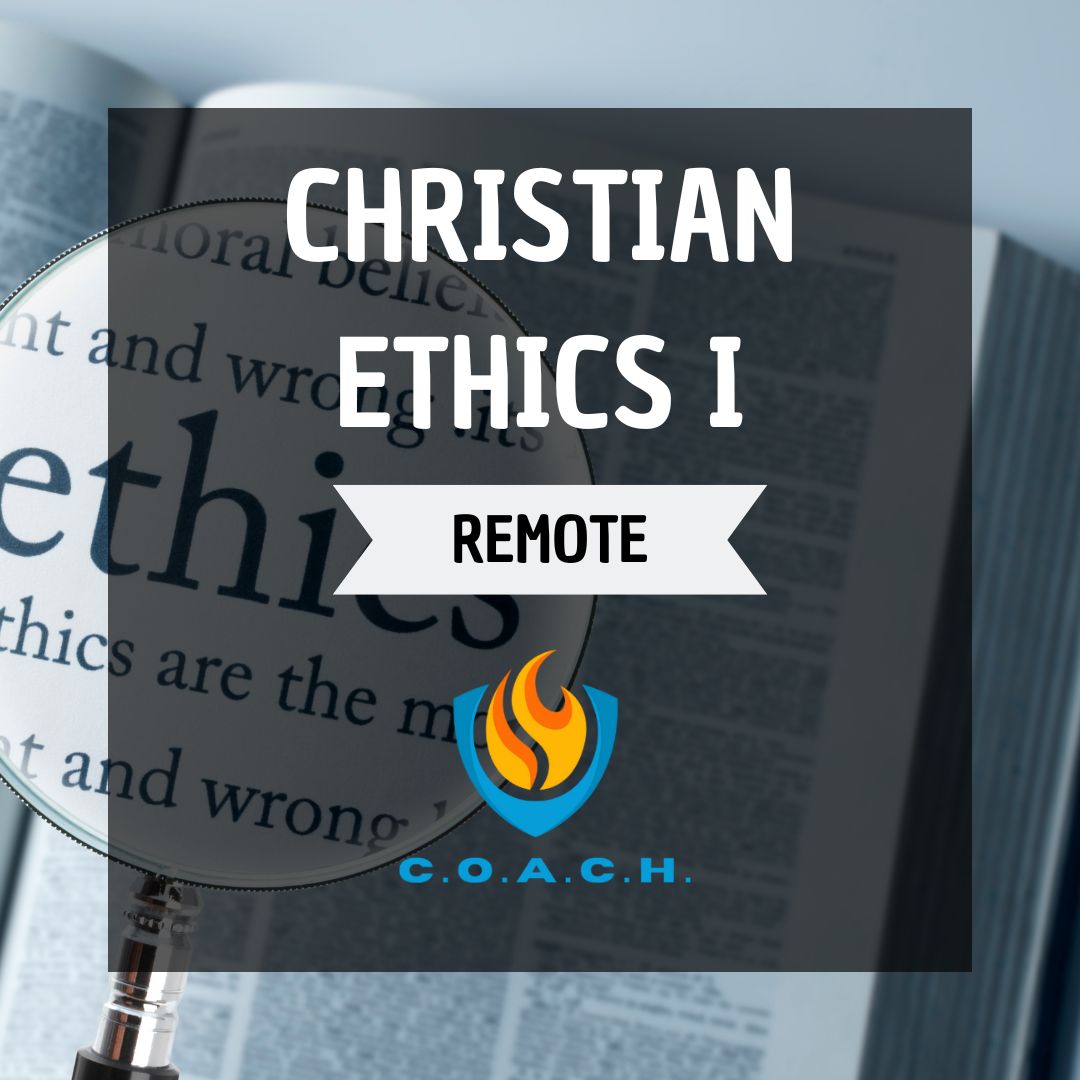Format: 8-week online course
Instructor Information
Name: April McMahon
Email: april.mcmahon@coachhomeschool.org
Prerequisite: None
Course Overview: Christian Ethics I is an introductory course designed to provide students with a foundational understanding of Christian ethical principles and their application in various life contexts. This course explores the moral and ethical teachings found within the Christian tradition, with a focus on key biblical, theological, and historical perspectives that shape Christian ethical thought.
Course Objectives: By the end of this course, students will:
- Understand Christian Ethical Foundations: Develop a deep understanding of the historical, theological, and biblical foundations of Christian ethics, including the teachings of Jesus, the Ten Commandments, and key ethical themes in the Bible.
- Ethical Decision-Making: Gain the skills and knowledge necessary to engage in ethical decision-making rooted in Christian values, taking into consideration contemporary moral dilemmas.
- Ethical Theories and Frameworks: Explore various ethical theories and frameworks within the Christian tradition, such as virtue ethics, deontological ethics, and teleological ethics, and analyze how these principles apply to real-world situations.
- Social Justice and Compassion: Investigate the Christian call to social justice, compassion, and caring for the marginalized and vulnerable in society. Analyze the role of Christians in addressing social issues and promoting a just society.
- Contemporary Ethical Issues: Apply Christian ethical principles to contemporary moral challenges, including issues related to bioethics, environmental ethics, human rights, and technology.
Course Material
Only those items required to be obtained by you are listed on this syllabus. Some reading material and/or media links used in the course—but not required for purchase
- Holmes, A.F. Ethics: Approaching Moral Decisions, 2nd Edition. IVP, 2007. ISBN: 978-0830828036.
- Mere Christianity by C. S. Lewis (BOOK) You may purchase a hardcopy, however the PDF is available along with the audio book with visuals within each lesson.
- AUDIO & VISUAL: Provided in the Lessons
- PDF DOWNLOAD: Click here
- Bible: Unless otherwise specified, you may use the Bible version of your choice. If a specific version is required, you may wish to purchase for your personal library. Many versions are available free online at: www.biblegateway.com, www.biblestudytools.com/bible-versions/, www.bible.com/versions, etc.
IMPORTANT: Textbooks and other materials in this online course are carefully selected and approved by COACH faculty to engage students in learning. Views expressed in the material may not necessarily reflect those held by COACH. We expect students to engage with course material in a mature and respectful way, understanding it may not always align with a biblical worldview and must be engaged with maturity and critical thinking. If you struggle with the content of the material from a biblical or theological perspective, please contact your course instructor for advice and guidance.
Course Assignments
Check COACH Remote Online course page for assignment instructions.
- Being Active (25-40% of Final Grade)
- Take part in discussions and readings.
- Join in on discussion boards and read assigned material.
- Do your readings and watch videos before discussions so you can talk about them. ALWAYS use biblical support for your claims/opinions.
- Homework
- Weekly Assignments: Read & Write
1 Paragraph Summary of the Mere Christianity Chapters - Weekly Topical Discussions (APA Format for Works Cited)
It’s important to actively engage on the discussion board. To understand how your participation will be evaluated, consult the discussion board rubric in the Documents section of the course. If not instructed otherwise, share your initial response to the discussion question by the middle of the week (Wednesday, 11:59pm CST). After that, make sure to read and reply to a minimum of two initial posts from your classmates by the end of the week (Sunday, 11:59pm CST). - Weekly Ethics Quiz (Weeks 1-7), and a Final Exam (Week 8)
- Weekly Assignments: Read & Write
The assignments help you understand and use what you’ve learned. They’ll help you think more deeply about ethics and grow spiritually.
APA Writing Style Guidelines
- Headings:
- Use clear and concise headings to organize the content of your paper.
- APA provides specific formatting guidelines for different levels of headings (e.g., Level 1, Level 2, etc.).
- Headings should be bold, centered, and capitalized.
- In-text Citations:
- When referencing sources within the text, include the author’s last name and the publication year in parentheses (e.g., Smith, 2019).
- For direct quotations, include the page number (e.g., Smith, 2019, p. 25).
- When citing a work by multiple authors, use an ampersand (&) when citing within parentheses (e.g., Smith & Johnson, 2020).
- Reference List:
- List all sources cited in the paper on a separate page titled “References.”
- Alphabetize references by the author’s last name.
- Follow a specific format for different types of sources (e.g., books, articles, websites).
- Include the publication date, title, and other relevant information for each source.
- In-text Citations for Electronic Sources:
- Include the author’s name, publication date, and a specific page or paragraph number for direct quotations from online sources with no page numbers.
- Include the DOI (Digital Object Identifier) when available for electronic sources.
- Tables and Figures:
- Tables and figures should be labeled and numbered consecutively.
- Each table and figure should have a clear title and source citation (if applicable).
- Place tables and figures close to where they are first mentioned in the text.
- Quotations:
- Use double quotation marks for direct quotations.
- Longer quotations (40 words or more) should be presented in block format without quotation marks.
- Reference Page and DOI:
- When citing online sources, include the DOI if available. If a DOI is not available, provide the URL of the source.
When referencing external works or sources, include a Works Cited page. Note that the Bible is also considered a source.


Reviews
There are no reviews yet.